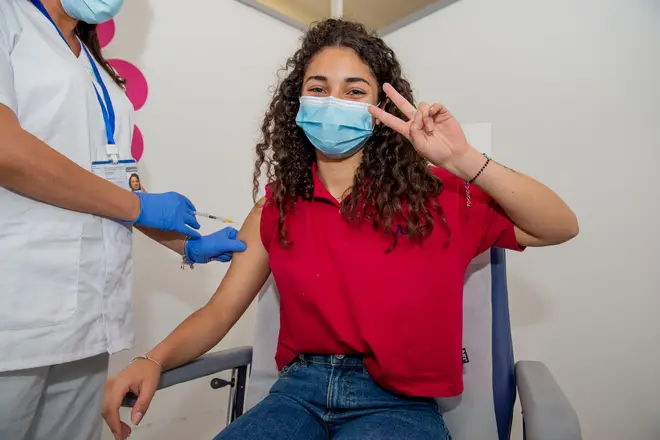
Paul Brand 10am - 12pm
6 June 2021, 15:56

Bookings will open up for under-30s to get their in England from this week, Matt Hancock has confirmed, as the UK vaccination program continues at pace.
The health secretary told reporters on Sunday that the move would take the country "a step closer to the point when we have been able to offer the vaccine to all adults in this country".
In England, people aged 28 and 29 are expected to be next in line for the jab, with Mr Hancock telling Sky News this will begin this week.
Read more: Half of people in their 30s take up vaccine in England over just two weeks
Read more: 'No immediate need' to vaccinate children, JCVI member tells LBC
Wales invited 18 to 29-year-olds to come forward for their jab in mid-May, while Northern Ireland opened vaccination for 25 to 29-year-olds on 20 May. Scotland has yet to offer vaccines to under-30s.
However, some walk-in clinics in England have already offered vaccines to under-30s, resulting in long queues as young people rush to get the jab.

People queue for vaccinations at Twickenham Stadium
Mr Hancock urged people to get the vaccine, as he warned the "majority of people going into hospital right now are unvaccinated".
"Once we have got everybody having had their second dose, then you will get this protection that we are seeing at the moment among older people, you'll get that protection throughout the whole adult population."
Read more: Boris Johnson to urge G7 to vaccinate world against Covid by end of 2022
Read more: Second Covid-19 jabs ‘to be sped up for over 40s’
But as the country waits in anticipation for the government's decision on whether the 21 June unlocking will go ahead, Mr Hancock added that the vaccines have "severed but not broken" the link between a rise in cases and an increase in the number of people being admitted to hospital.
"The prime minister and I and the team will be looking at all of the data over this week.... We will be guided by the science, but ultimately it will be ministers who make these decisions," he said.

UK should listen to advice on whether 12-15 year olds should be vaxxed
The government aims to offer all adults in the UK a first jab by the end of July. Over 40 million people have received a first dose, with over 27 million also having been inoculated with their second dose.
The vaccination effort has focused on adults so far, but on Friday the UK's medicines regulator the MHRA approved the use of the Pfizer vaccine in 12 to 15-year-olds, paving the way for children to be vaccinated.
Some countries, such as Germany and France, have already announced plans to begin vaccinating children.
But, the UK government has said they will only extend vaccination to under-18s if recommended to do so by the Joint Committee on Vaccination and Immunisation (JCVI).
Read more: Tony Blair: 'Time to distinguish' between people who have and haven't had jab

'No immediate need' to vaccinate children, JCVI member insists
Giving an insight into the thinking of the committee, JCVI member Professor Simon Kroll told LBC's Swarbrick on Sunday that current evidence "does not support" school children being large spreaders of the disease and that the priority remains to vaccinate the most at risk first.
However, he added: "If the focus of strategy were to move more towards prevention of transmission... in order to get society moving again the focus may change. This will be a policy decision but it won't be a health decision primarily."
Speaking ahead of Prof Kroll's comments, Mr Hancock suggested there could be some "upsides" for education if children are vaccinated.
"We know that the vaccine both protects you and helps you stop transmitting, and I want to protect education as much as anybody does... and so making sure that we don't have those whole bubbles having to go home, especially as we saw over the autumn for instance, that has upsides for education."